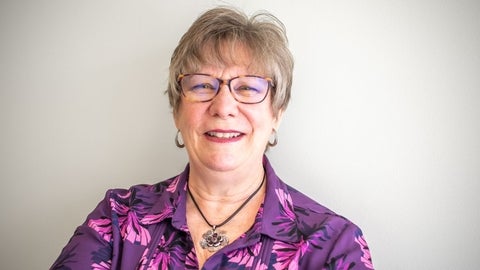
Over the last 35 years, Diane Bandura hasn’t just punched a clock at the School of Optometry and Vision Science, specifically at the Centre for Ocular Research and Education (CORE). She has made deep friendships, felt supported through the ups and downs of life, and grown as a professional.
Now that she’s retiring, she’ll miss the place, the people and even the oft-unpredictable challenges of work. At the same time, she’s looking forward to having more time to sit in her backyard, read and spend time with her group of School-connected girlfriends, most of whom are now retired – they’re taking her to Stratford soon to celebrate her new freedom.
Bandura grew up in the Waterloo region and completed a one-year optometric secretarial program at Conestoga College after high school. It was a path recommended by her guidance counsellor following aptitude tests – that or dental assistant.
Not that she has any regrets about her career, but she wonders if the recommendation might have been different today – after all, she had good marks and was interested in healthcare. But it was 1979 and the 17 students in her optometric secretarial program were all female, while the students at the University of Waterloo School of Optometry, as it was then known, were very predominantly male. As a result, Bandura and her classmates were invited to parties at the School.
The parties were far from their only visits. As part of their program, the Conestoga students regularly came to the School for lectures and labs where they learned about the anatomy of the eye, optics, optometric terminology, and skills such as how to verify lens prescriptions and order spectacles. Often it was the director or former director of the School who taught them.
Even back then, Bandura thought it would be interesting to work at the School, but an opportunity came along to work with a new grad establishing a practice in London. She ended up working with Dr. Alfred Dick (OD’79) for nearly a decade. A few years ago, she attended his retirement celebration.
In 1989, though, on a visit to her parents in St. Agatha, Bandura wondered again if she might be able to work for the School. She dropped off a resume, which landed her a job as the receptionist for what was then known as the Centre for Contact Lens Research (now CORE). After only a few months, the research coordinator position opened up, so Bandura took on that role, which evolved into her current administrator role.
“I loved every minute of it,” says Bandura. “I feel I’ve had a front-row seat to the groundbreaking research that goes on at CORE. It’s been very fulfilling to see the new products that have come onto the market as a result of CORE’s work. We’ve come a long way on the international stage and that’s been a testament to the hard work the members of CORE have put in.”
The camaraderie, family atmosphere and lack of hierarchy have made it a special place to work, says Bandura.
“We’re a close-knit group of people and we all know everyone has an important role in achieving CORE’s goals. Personally, I’ve had a chance to grow from being the receptionist to taking on a more responsible role. I had a great relationship with Des Fonn, our founding director, and now Lyndon Jones, as well as other members of our senior administration team and CORE in general.”
Now, though, Bandura is glad she’ll have more time to spend with her cats, friends and mother, who’s in long-term care. She anticipates projects around the house, Jays games with her Toronto-based son, and perhaps some travel.
“It’s time,” she says about retirement. “Time for this place to have some new blood too.”